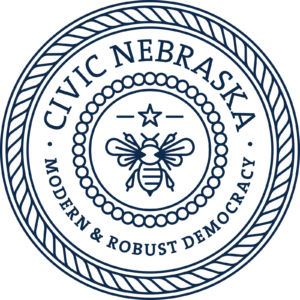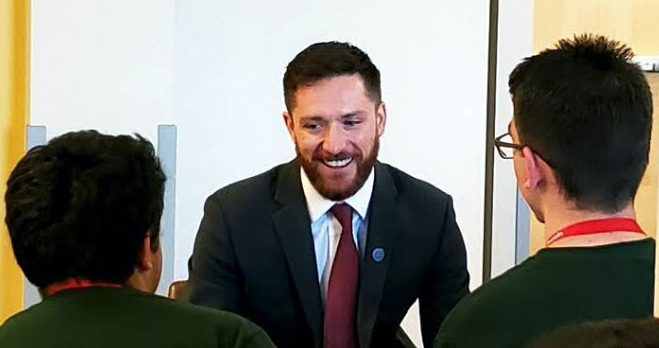On June 7, Director of Voting Rights John Cartier had the privilege of speaking to Cornhusker Boys State about becoming more civically engaged. Eschewing the temptation to tick off a list of organizations or ready-made activities for the soon-to-be high-school seniors, John – a Boys State alum himself – shared his own story and his philosophy on serving. Here are John’s prepared remarks.
Good afternoon. My name is John Cartier, and I am the director of voting rights for Civic Nebraska. We’re a statewide nonprofit organization that seeks out meaningful ways to build informed community leaders and ensure that our democratic institutions are nonpartisan, accessible, and modern.
We do this through our three main programming areas of Youth Civic Leadership, where we serve over 1,500 students a day in after-school programs that focus on building skills in civic leadership, STEM, and career readiness. There are our Civic Health Programs, which engage and connect Nebraska neighbors and communities to civic life, including young people, through events such as our Capitol Experience Day. The last program – and my own personal favorite – is the one that I lead, known as Voting Rights Initiatives.
We believe that a more modern and robust democracy for all Nebraskans means a year-round culture of civic engagement that creates lifelong voters. Access to the ballot is essential to this philosophy. Civic Nebraska is vigilant in ensuring our elections are modern, fair, and accessible. Whether successfully fighting and advocating for online voter registration, uniform election guides, or access to the polls on Election Day, we empower voters to be the change they wish to see.
My job is an interesting mixture of civil rights attorney, supervising organizer, and voting rights lobbyist. I am responsible for advocating on behalf of all Nebraskans’ and their interests as voters. Civic Nebraska seeks to eliminate barriers to the ballot box and to modernize our election system.
Today, I get to speak with you all about becoming civically engaged. What will be most useful to start is to tell you about me. My journey started exactly 10 years ago, at Nevada Boys State. I was sitting in a seat similar to yours, wondering what I was going to do with my life. I was not sure what I was doing getting on a bus at 4 a.m. from Las Vegas to Reno for a week away from my friends, family, and plans for World of Warcraft binges.

But it didn’t take long for me to realize that Boys State would be one of the most important experiences of my life. I made lifelong friends, became the Senate majority leader, had some bills passed, had a few more get rejected, got to see my City of Anderson win the first-place award for the top city and to finally come away with a sense of what I should be doing with my life.
Before preparing my talk today, I reached out to my friend Saul. He was in the City of Anderson with me. We became great friends and stayed in touch. I had only met Saul once in person at Boys State, but that was all it took for us to build a friendship though we’ve moved to different cities, states and even countries.
We lived in the same city, but I wouldn’t have met Saul if it had not been for Boys State. This is the type of connection you can make with the people sitting next to you here. Boys and Girls State is a spectacular display of what civic engagement should look like: a meeting of different people of different backgrounds and views, but the formation of a lasting bond that brings us together as we seek to answer the difficult questions and to solve the hard problems.
In 2009, I was focused on the next chapter of my life. I did not know what I was going to do, but I knew that my week at Boys state felt right. This feeling kept me moving forward as I arrived at Concordia University, Nebraska to start college. This feeling prompted me to be my friend’s campaign manager as he ran for Seward City Council while we were still in school. This feeling led me to attend the University of Nebraska College of Law. This kept me going through some of the most difficult moments in my life: the months of 12-hour days studying for the bar exam or frustrations of trying to find a law clerk job that would help pay the bills for my family.
Boys State served another purpose: It gave me an escape from the looming foreclosure on our house, the water and electricity being shut off because we couldn’t afford the bills, and the jealousy and rage I felt as I realized most of my classmates barely noticed others were struggling. During this time the Great Recession rocked Las Vegas, along with the rest of the nation. Thousands of people lost their homes – my family included.
From that experience, Boys State built the foundation for where I am today. It gave me direction, and without me realizing it, helped me identify what my values are. This is important: Your values are what drives important life decisions, politics, and civic engagement as a whole. Your values are shaped by your experiences and your decisions. And these values, in turn, are what give you passion and purpose in life. It will lay out a road to follow as each of you figure out how to best use your talents.
This is not an easy process, nor one that is just filled with positivity. It was during the deepest levels of my depression over losing my life in Las Vegas that my values began to emerge. Equality. Truth-seeking. Competitiveness. These are the values that keep me going even when the road gets difficult.
Instead of letting my depression and anger continue to control me, I decided to embrace those feelings and to accept events that were out of my control. After Boys State, I knew I had found a pathway to prevent another kid from losing their home. It showed me that I was the happiest and felt the most fulfilled while I was on the road of civic engagement.
This process came full circle just before I started my job at Civic Nebraska, as director of voting rights. Directly out of law school I was in-house counsel for a Fortune 500 company. The money was something I couldn’t resist coming out of law school. But six months into my job I was miserable.
A month before the job at Civic Nebraska opened up, a sign screamed at me that I needed to get back onto my road. Every attorney in Nebraska needs to do a certain amount of continuing-legal-education hours. My company hosted a four-hour session that focused on the 2008 mortgage financial crisis. I heard directly from the attorneys who were the boots on the ground when institutions, greed, and financial deregulation allowed investors to gamble away millions of peoples’ retirements and homes. All of this happened while the American people were asleep – but the people making a profit were very awake.
This reminded me why I went to law school; why some of the happiest moments I’ve experienced in life was during Boys State. Shortly after this realization, my current job opened up and I immediately applied. Here I am today fulfilled and happy with my work. It is the type of job I am excited to do every day. I hope all of you seek out and find the type of work that leaves you fulfilled and satisfied.

Now back to the subject at hand: Why should we be civically engaged? Simply put, every American has a duty to directly engage policymakers. And this goes beyond just voting. It involves talking to your neighbors about important issues, encouraging others to join the process, or actions such as writing letters to the editor to your local newspaper about topics on which you have a strong opinion. We do this because it is the only way a republic such as ours can exist.
After the 1787 convention that gave us our Constitution, a woman asked Benjamin Franklin as he was leaving Independence Hall: “Well, doctor, what have we got – a republic or a monarchy?” His reply: “A republic, if you can keep it.”
A republic, if you can keep it. If Americans are not awake, engaged, and active, others with adverse interests will call the shots for us. This inevitably leads to more suffering by our people.
We must be civically engaged because there is no other option. This engagement must be defined by each of our values, working and communicating together. Everyone views the world differently. This should not be seen as a weakness, but a strength. A diversity of views, values, and people is what makes this country great.
Today, I hope I can impart this on each of you as you begin your own unique – and awesome – journey. My final two pieces of advice come from a judge and a retired city attorney. First: During school, I shadowed a Lancaster County judge for a day. At the end of our time, I asked him, “What is the most important piece of advice you could give me as a fledgling attorney?” He responded: “Be kind to people.”
Second: A couple of months ago I was stuck in a D.C. airport. Sitting next to me at the bar was a newly retired lawyer who had been practicing for over 30 years in New Orleans as its chief city attorney. After a few drinks, and well into a long conversation about life, family, and the law, I asked him: “What is the most important piece of advice you could give me?” He said: “You don’t need to be the smartest person in the room. As long as you’re the most prepared, you will be victorious in whatever you do.
Be kind to people. Be the most prepared in the room. Remember these two things and figure out what values drive you. You will be well on your way – not only to being a productive member of society but someone who is civically engaged for the betterment of your fellow Americans.
With that, I would love to open up a discussion about values. If there are no questions, turn to the people next to you and let’s discuss three things:
1) Think about the time you were most happy and felt the most fulfilled. What were you doing? Where were you? What were the feelings?
2) Identify what values you can reasonably tie to those moments; and
3) How do those values and moments fit into being civically engaged?
Think about what makes you the most passionate and how can you advocate from that place to make the world a better one than how you found it.
Let’s do this for the time we have left. Then let’s all talk about the values you identified, and how they motivate you to being civically engaged.
Thank you all. I hope you will find the path that makes you the most fulfilled. You’re here because you’ve been identified by your peers and teachers as future leaders. It is up to you to encourage people you know who are less inclined to be civically engaged to get with the program. There will be disagreements over policy – there always are – but as long as we keep in mind the common values that drives each of us, we can overcome divisive politics and work together to create a better world for many generations to come.

Learn more about Civic Nebraska’s Voting Rights Initiatives here.


